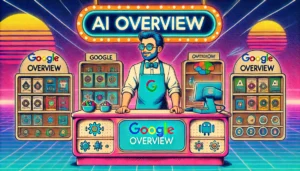Why is SEO So Da** Hard? A Primer for Small Business
There are over 1.8 BILLION websites worldwide. Over 190 MILLION pages are added EACH DAY. So, why is it hard to rank in Google, you ask?

One of the things that nearly every customer asks us about is search engine optimization (SEO).
Usually, this looks something like:
- What is search engine optimization?
- Can you guarantee my website will show up at the top of Google?
- Can you get me to the top of Google?
Well, not without significant time, budget, or both.
These (understandable!) questions betray antiquated ideas about search engine optimization that are no longer true or, at the very least, portray a lack of understanding about how search engine optimization really works.
That’s why it’s worth spending a little bit of time thinking about what search engine optimization is and how it’s relevant, particularly for small business owners.
This is not:
- a guide for marketers
- a guide for professional SEO marketers
This is:
- for the very busy small business owner
- for those looking for some help understanding SEO
- for those wondering…
What Is Search Engine Optimization?
Let’s start by making sure we’re talking about the same thing.
When we talk about search engine optimization (or SEO – the words are interchangeable), we’re really talking about the process of putting your website in a position where it can be found on any number of search engines (predominantly Google, which currently has 80% of the search engine market).
In today’s world, though, “search” is multi-faceted: when you ask Siri to “find the nearest barber” or Alexa to “recommend good books,” these are queries and Siri/Alexa is the search engine. Those search modalities deserve their own post.
It’s worth nothing, though, that not all searches are typed out anymore and “SEO” isn’t just about “people typing stuff into Google,” but rather any mode in which a person by voice, typing, or something else is trying to find information through a platform.
With that behind us, more “traditional” search engine optimization (e.g,. showing up on Google) can generally be broken down into three dimensions:
- On-Page SEO
- Platform SEO
- External or Off-Page SEO
These categories of SEO will go a long way in helping you rank in Google. But before we dig into them, let’s talk about Google. You might think you know what it is, but do you really?
How Google Gets Paid
Google’s goal as a search engine is to index all of the world’s information. But they don’t do that out of the kindness of their heart.
They do it because, in the interconnected, digital world, indexing and curating the world’s information is what gets them paid.
To the tune of a few hundred billion dollars a year. That’s a lot of money for a ‘free’ service.
The idea is this:
- User looks for information.
- Google finds information
- Google shows information, along with ads from businesses who want to be found when User looks for information.
Google wants to figure out how to index all the information that exists on all the websites across the web because, if they do, and users trust their results, Google can keep selling billons of dollars of ad space to businesses who want to “get found.”
In the old days, Google found and indexed information with simple keywords. If you had a bunch of keywords on your site, those keywords would show up on the Google Index and be associated with your website and boom, there you were. And that (more or less) worked…when there weren’t that many pages.
But, people started to “game” this system and users would get frustrated. They’d “bounce” from site to site until they found the answer they were looking for.
Google, as a profit-seeking business, knows that if people get too frustrated, over time, they will find alternatives. Search engines are “sticky,” but not immune to disruption.
Just ask the people who invented Siri.
So, Google did what every smart business does: they learned and adapted to make sure their bottom line was protected.
Remember, hundreds of billions of dollars of ad revenue depend on people using Google.
So, Google’s primary goal right now is to index all the world’s information and make it accessible, but it has to do it in a way that provides a good experience for users by making sure they’re not providing irrelevant information.
They do this by making sure that when they return a result, they return the best possible result they can given the user’s search query or search term. They achieve relevant results in a number of different ways but mostly they want to make sure:
- The information being returned is consistent with what the person was looking for. So, if I’m searching for a plumber near me, I don’t get a shoe repairman or an electrician or a web developer.
- They also want to make sure they’re returning an authoritative and trustworthy result.
Authoritative or trustworthy might seem subjective but the reality is there’s so many data signals around the internet that can help to show whether or not a site is both of these things.
What are some signs your website is trustworthy or authoritative?
- The number of people that visit your site
- How long they stay
- How much they engage or interact
- Backlinks to your site
Trustworthy and Authoritative Make a Better User Experience
That’s how search engines work at a very high level. As you start to have different kinds of queries, for instance shopping queries or searches for local businesses, some of those things can start to change, but Google is really trying to figure out how to match results to searches, make it accessible, and to return the best possible option.
Because that’s how they get paid.
They do this by looking at signals like trustworthiness and authoritativeness to help demonstrate that this, in fact, is the best possible result it can return. Returning results like this creates a trustworthy user experience.
Now, in the world of search engine optimization there are a lot of ways now to start thinking about the user experience. Google cares about user experience and the different dimensions of it.
We’ve already talked about how to be trustworthy and authoritative but being relevant is also important to that experience. If users don’t get relevant results, they won’t trust Google. So if Google can’t trust your site, they won’t share it with their users.
Relevancy is also the aspect that’s easiest to control.
Is your website about what you do?
If you’re a plumber, does your website answer plumbing focused questions? That sends signals to the search engines that your site is relevant for that particular search. It also shows that you’re irrelevant for other kinds of searches…like searches for developers. Because you’re not a developer.
Because you’re not a web developer.
The more focused the content, or the more focused your information, the better it is.
To show this relevance, you need to have the right keywords in the right places. This is on-page SEO.
On-Page SEO
On-page SEO is the practice of choosing relevant keywords and organizing content in such a way that Google knows the page is relevant and it’s clear what your website or that page is about. Because remember; pages get ranked, then websites. We tell Google our pages are relevant by doing things like:
- Using the right headers
- Using image alt tags
- Having longer content
- Using internal links
These are on-page signals that let Google know what your content is about and that it’s relevant to a particular universe of of queries. On-page SEO will help with establishing relevance by helping Google find your page and showing it to the users who are searching for it.
But what about trustworthiness and showing authority? This is where Platform SEO comes into play.
Platform SEO
Remember, trustworthiness and authoritativeness are voted on, not by your content, but by interaction with your content. So, for instance, trustworthiness is often a function of:
- Do customers come to your site?
- Do they stay on your site?
- Do they engage with your content?
So, how do you build up the trustworthy dimension? Well, you need to make sure that you have, what I call, Platform SEO. Your platform, at a minimum, has to meet certain criteria so that customers can come and have a good experience. This is determined by things like:
- Mobile device friendliness
- Is the website fast?
- Does it load quickly on every device?
- Is it secure?
If somebody goes to a website and they see one of those padlock things that say this website’s not secure and could be a risk, that’s going to minimize or diminish the trustworthiness of your website, and it’s going to tell Google that maybe your site isn’t so trustworthy.
Dangerous does not = trustworthy.
When users see this warning, they leave. That’s what’s called, in the world of analytics, the bounce rate. So people, by their behavior, are showing that this is not a good or trustworthy site.
Accessibility is also an important issue to address that impacts trustworthiness. A lot of people build websites assuming that everybody that comes to a website is able to see color or even see at all. They don’t think about things like screen readers or color blindness or the other kinds of disabilities that might prevent people from being able to interact with the website.
Accessible = trustworthy.
These kinds of issues have nothing to do with the content of your website but with the platform that your website is hosted on and the maintenance of it. I wouldn’t say these things are more important than relevance, but they’re at least as important. If you have a super relevant website but the experience seems sketchy and people are leaving, Google is going to ding you for that.
Because they can’t make money if people don’t trust their results.
Off-Page SEO
Finally, there is the external or off-page SEO and off-page SEO is really about the authoritative dimension.
- Does your content get shared?
- Do people engage with it?
- Are people linking back to your pages ?
From a local business perspective, do you have local organizations linking to you or are you active in the community? Are local organizations like your chamber of commerce or maybe nonprofits you work with linking back and and talking about you as a constructive member of the community? That’s other people essentially demonstrating by their behavior that you are a stand-up business or organization.
And if those three things are working, if you’ve got good platform SEO, good on-page SEO, and you are building relationships and have people vouching for you online, then those three things together are going to help you really start to show up in search engines and start to get some ranking.
Each of those aspects requires its own set of work, but that’s the overall way to think about the universe of search engine optimization for small business.
Overwhelmed? Don’t want to do it yourself? Let The Pros handle it.
This is why we created our SEO packages for every budget; to help you capitalize on search engine optimization even if you don’t understand it!








